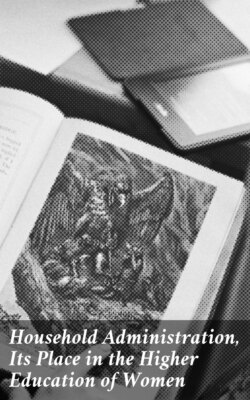Читать книгу Household Administration, Its Place in the Higher Education of Women - Various - Страница 3
На сайте Литреса книга снята с продажи.
PREFACE
ОглавлениеTable of Contents
The object of this book is threefold. (1) It endeavours to define the importance and scope of household administration in the twentieth century, which, when analysed into its component parts, is found intimately to concern the right conduct and domestic care of individual human lives, from their inception to their close. (2) It seeks to demonstrate the necessity of an adequate preparation for all who assume the responsibility of such administration; particularly for those who, in consequence of their parental responsibilities, their wealth, their social status, or their professional duties, exercise far-reaching influence through their standard of life and example. (3) Finally, it gives prominence to the fact that the domestic arts are no collection of empirical conventions, to be acquired by imitation or exercised by instinct. It is clearly demonstrated that the group of sciences upon which they rest is more comprehensive than most people suspect, and that their contribution to the solution of pressing domestic problems has so far been but partially realised. It is, therefore, of considerable interest to observe the remarkable consensus of opinion on each of these points among the recognised experts in their subjects, to whom were entrusted the preparation of the various sections of this book. The writers of the papers, untrammelled by editorial restrictions, each writing from the fulness of her knowledge, tested by ripe experience, reached independently conclusions conspicuous for their unanimity. It will be evident to the most casual reader that, in the opinion of these thoughtful women, blind instinct must yield place to trained intelligence, if home life is to be preserved and modern conditions of existence adequately adjusted to human requirements.
Progressive changes, social, commercial, industrial, and, last but not least, educational, now require that this trained intelligence be fostered by organised instruction outside the home, adapted to the needs, present or prospective, of girls in every grade of society. Such instruction, whether in the fundamental sciences or in the applied arts, must be associated with individual practice in laboratory, studio, workroom, and kitchen; the details to be varied as circumstances dictate.
If, however, consistent applications of such knowledge are to be made in order that desirable saving in time, labour, money, health, or happiness shall be effected, graduate women of high attainments are urgently needed for the work. It is they only who can bring to bear upon the problems of childhood and adolescence, of food, of clothing, of housing, of domestic economics, of occupation, rest, and recreation, the patient study and research in the interests of humanity, which men of similar standing have lavished upon the advancement of commerce and industrial processes. It is by their skilled labour in the almost untrodden field of domestic science that the millions of homes will benefit which are committed to the charge of women who possess neither time, opportunity, nor ability to carry out these indispensable investigations, but who can yet effectively fulfil their responsibilities, if they be supported by systematic training and organised common sense, based on sound knowledge.
It is in the hope of forwarding these objects that this book has been prepared.
ALICE RAVENHILL.
CATHERINE SCHIFF.
Nov. 1910.
